Food Loss Related News

In Thailand, discovering a better way to waste not, want not
07/12/2023

Strengthening climate resilience, adaptation and mitigation through food loss and waste reduction
01/12/2023

FAO at COP28 | Agrifood system solutions are climate solutions
23/11/2023
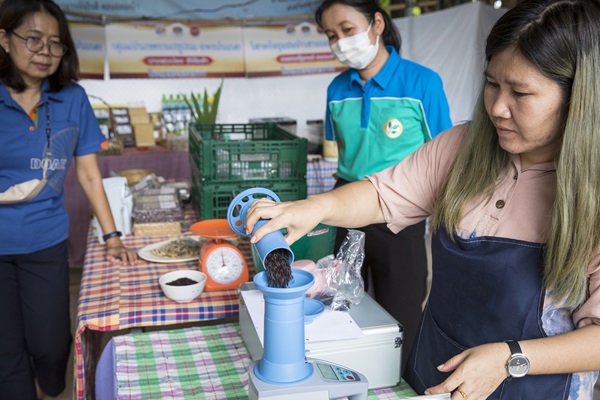
International Day of Awareness of Food Loss and Waste: FAO calls for circular model in agrifood systems
29/09/2023

Presenting the Guidelines for action on food loss and waste reduction in the Near East and North Africa
20/09/2023
Food loss and waste (FLW) reduction is an important entry point to more sustainable, resilient and equitable agrifood systems in the Near East and North Africa (NENA). Interventions to reduce FLW support adaptation to and mitigation of climate change, lower the pressure on scarce water and ara...

The #123 Food Loss and Waste Pledge for Climate Action
08/09/2023
FAO #123 Pledge statement is now available.
Visit the Food is Never Waste Coalition page for more.

Knowledge sharing, learning and technical exchange on food loss and waste reduction webinar focus on the Caribbean region
10/11/2022

Leveraging science and innovation for food loss and waste reduction
26/10/2022

Tackling food loss and waste: A triple win opportunity | FAO-UNEP press release
29/09/2022

Investment opportunities and legislation frameworks on FLW. Some relevant FAO resources are available
30/08/2022
Food loss and waste (FLW) is a global burden with a negative impact on the economic, social, and environmental dimensions of sustainable development. The loss and waste of food suitable for human consumption hampers food security and nutrition and hinders the realization of the human right to ...

Knowledge sharing, learning and technical exchange on food loss and waste reduction webinar: Africa
21/07/2022

G20: FAO says global threats to agrifood systems need complex approach
10/07/2022
Rome/Labuan Bajo, Indonesia - The challenges undermining global food security call for a complex approach embracing investment, policy reforms and better use of resources, QU Dongy...

Knowledge sharing, learning and technical exchange on food loss and waste reduction webinar: Asia
31/05/2022

2021 International Day of Awareness of Food Loss and Waste global virtual event
22/09/2021

Food loss reduction innovations showcased at Expo Dubai 2020
21/09/2021
The World Food Day 2021 was the first International Day to be celebrated on 16 October at Expo Dubai, which runs from 1 October to 31 March 2022. The UN Secretary General disseminated a message thorugh social media "the way we produce, consume and waste our food is a heavy toll in our pla...
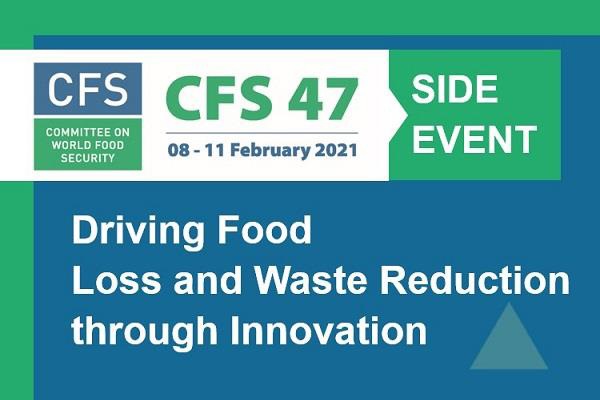
Driving food loss and waste reduction through innovation
02/02/2021
-.tmb-th600x400.jpg?Culture=en&sfvrsn=3ab197db_6)
2021 is the International Year of Fruits and Vegetables (IYFV)
01/02/2021
The UN General Assembly designated 2021 the International Year of Fruits and Vegetables (IYFV). This is being launched officially on 15th December. Stay tuned! we will communicate soon details for participation.
The IYFV 2021 is a unique opportunity to raise awareness on the important role of fruits and vegetables in human nutrition, food security and health and as well in achieving UN Sustainable Development Goals.
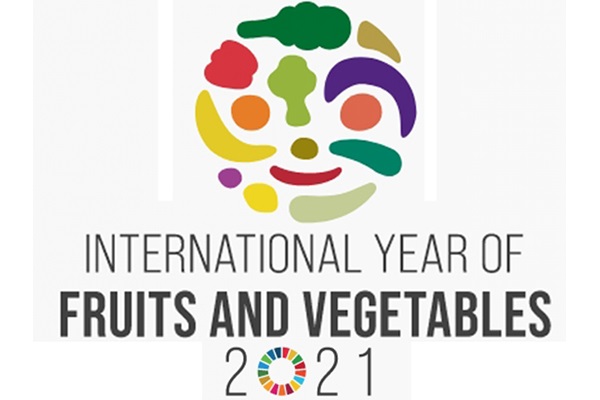
The International Year of Fruits and Vegetables 2021 was officially launched by the Director General of FAO
16/12/2020

AGRITECHNICA ASIA: “Post-harvest Loss Briefing: Technologies and Management”
01/12/2020
The Agritechnica Asia and Horti Asia digital talk about Post-Harvest Losses, which took place in late November, addressed the avoidance of losses by improved process management and handling of crops as well as opportunities to fund collaborative projects to introduce new technologies.
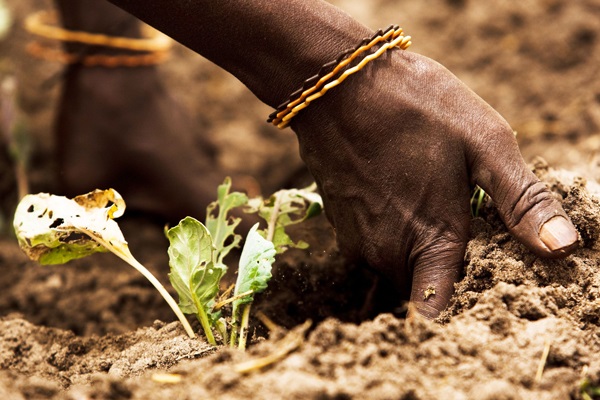
Agro-processors training organized by CARDI in Grenada
19/11/2020
Food Loss Related Publications
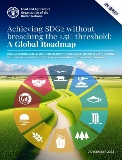
Global Roadmap for Achieving Sustainable Development Goal 2 (SDG2) without Breaching the 1.5°C
10/12/2023
A comprehensive strategy spanning the next three years that encompasses a diverse portfolio of solutions across ten distinct domains of action. Enormous amounts of resources – land, water, energy and labour – are used to produce food. When food is lost or wasted, these resources go to waste as well, impacting the efficiency of food production. Reducing food loss and waste is one of the domains of action illustrated in this Roadmap.
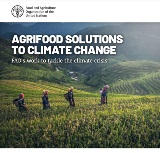
Agrifood solutions to climate change – FAO's work to tackle the climate crisis
29/11/2023
Amid a worsening climate crisis and slow progress in cutting greenhouse gases, sustainable agrifood systems and practices can help countries and communities to adapt, build resilience and mitigate emissions. FAO is working with countries and partners at all levels to address the challenges of food security, climate change and biodiversity loss. But success in this area will ultimately require global commitment to significantly increasing the quality and quantity of climate finance.
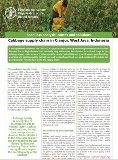
Food loss analysis causes and solutions: Cabbage supply chain in Cianjur, West Java, Indonesia. Fact Sheet
30/09/2023
Cabbage (Brassica oleracea var. capitata) is a popular vegetable to grow among Indonesian smallholder farmers due to high demand and relatively easy cultivation. Post-harvest is a critical stage in the cabbage supply chain because it determines the product saleability and price. However, poor handling practices and careless quality control can lead to significant food loss and consequently reduce the profit margins for all actors along the supply chain.
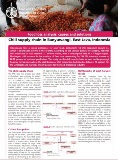
Food loss analysis causes and solutions: Chili supply chain in Banyuwangi, East Java, Indonesia. Fact Sheet.
30/09/2023
Indonesians have a strong preference for spicy food, particularly red chili (Capsicum annum L.), which is abundantly grown in the country. According to the Central Bureau of Statistics, national chili production in 2020 reached 2.77 million tonnes, with a consumption rate of 2.14 kg per capita. The largest chili producer is the province of East Java, accounting for 784 050 thousand tonnes or 28.28 percent of national production.

Guidelines for action on food loss and waste reduction in the Near East and North Africa
31/08/2023
The Guidelines for action on food loss and waste reduction in the Near East and North Africa provide support to Member Countries to implement the Voluntary Code of Conduct for Food Loss and Waste Reduction, an international instrument designed to guide FLW policymaking and interventions at global level.

The State of Food Security and Nutrition in the World 2023 | Urbanization, agrifood systems transformation and healthy diets across the rural–urban continuum
12/07/2023
This report provides an update on global progress towards the targets of ending hunger (SDG Target 2.1) and all forms of malnutrition (SDG Target 2.2) and estimates on the number of people who are unable to afford a healthy diet. This report has highlighted that the intensification and interaction of conflict, climate extremes and economic slowdowns and downturns, combined with highly unaffordable nutritious foods and growing inequality, are pushing us off track to meet the SDG 2 targets.

Food Loss in International Trade in the Asia-Pacific Region: Country Case Study on Bangladesh
08/05/2023
Bangladesh, a major producer of vegetables and fruits, faces constraints such as post-harvest management, inadequate transportation and storage facilities, limited access to quality seeds, and stringent quality standards imposed by importing countries. Good agricultural practices, post-harvest management practices, and value chain efficiencies are lacking, resulting in a significant amount of food loss.

Nutrition and the environment. Nurturing people, protecting the planet
26/04/2023
This discussion paper highlights the interlinkages between nutrition and the environment across various dimensions from policy to impact. It focuses on diets and food systems, which lie at the nutrition−environment nexus, including some aspects related to FLW.

The future of food and agriculture – Drivers and triggers for transformation
04/03/2023
This report aims at inspiring strategic thinking and actions to transform agrifood systems towards a sustainable, resilient and inclusive future.

Developing Capacity to Reduce Food Loss and Waste in Thailand
01/03/2023
Reducing FLW is not, however, a high priority for many micro, small and medium enterprises (MSMEs) in developing countries. MSMEs often do not quantify the food that is lost in their processing and distribution operations, or wasted in retail, and their real impacts on profitability and the environment.

Imperatives for Improvement of Food Safety in Fruit and Vegetable Value Chains in Viet Nam
28/02/2023
The publication draws on the results of safety tests, a stakeholder survey, and a literature review. It notes that building confidence in safe fruit and vegetables would encourage consumers to eat more of them, boosting people’s health and producers’ livelihoods. Its recommendations include expanding producers’ cooperatives and designated safe vegetable production areas, using incentives and controls to drive down chemical pesticide misuse, and publishing the results of regular testing.

Reducing food loss and waste in the Near East and North Africa
28/02/2023
This study looks at FLW from an economic perspective, considering producers, intermediaries, and consumers as key decision-makers. It builds on our accumulated experience in the analysis of the causes of FLW and solutions.

Food Science and Technology Solutions to Improve Food and Nutrition Security: Reducing Food Loss & Valorizing Food Processing Side Streams
31/12/2022
In 2022, the Institute of Food Technology/Food and Nutrition Security Steering Committee hosted a virtual roundtable discussion on their first challenge, “Food Science & Technology Solutions for Reducing Food Waste and Valorizing Waste Streams” on November 1 – 2, 2022. The goal was to identify current and potential future solutions from food science and technology that can contribute to the reduction of food loss and valorization of food processing side streams.

Food Loss and Waste country profile for Vietnam
31/12/2022
An approach to allow to present an indicative country profile showing per food product category and chain stage not only the amount of FLW but also the GHGEs related to producing the FLW and induced nutrient losses. The sum differs per product and chain stage. Focusing on food products and chain stages which largely contribute to FLW, FLW-induced GHGEs and nutrient loss can substantially lead to resource use efficiency and at the same time to climate mitigation action and nutrition security.

Enabling a legal environment for the prevention and reduction of food loss and waste
31/10/2022
Regulatory measures to tackle food loss and waste (FLW) include establishing institutional mechanisms for coordination of action, allocating clear roles and responsibilities among all stakeholders involved and setting binding targets for the reduction of FLW.
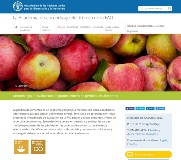
Food loss analysis case study methodology | E-learning course
30/10/2022
Food loss is a complex issue, often with multiple and interrelated causes operating at different levels. This e-learning course introduces the FAO Case study methodology for the analysis of critical food loss points. This method focuses on revealing and analyzing the multidimensional causes of losses in selected food supply chains, identification of critical loss points, and recommendation of feasible food loss reduction solutions and strategies.

Food waste management and circular economy in Mediterranean cities
26/10/2022
Stakeholders from across the Mediterranean shared practical experiences of their engagement in circular economy practices for food waste management at urban/local level. Tackling food waste and circularity from diverse angles of the Mediterranean food systems, they reflected on success factors and challenges, discussing ways to facilitate partnerships and replication of solutions across the Mediterranean.
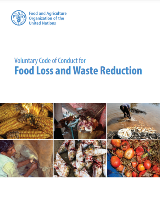
Voluntary Code of Conduct for Food Loss and Waste Reduction
20/07/2022
Following the request of the 26th Session of the Committee on Agriculture (COAG), FAO has developed the Voluntary Code of Conduct for Food Loss and Waste Reduction (CoC). The document was submitted to the FAO Conference for consideration and endorsement, and approved on 15 June 2021.
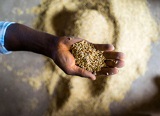
A holistic approach to food loss reduction in Africa: food loss analysis, integrated capacity development and policy implications
10/06/2022
This paper highlights the critical need for a paradigm shift of current research and development programs aimed at food loss reduction, as demonstrated by findings of a project implemented in Burkina Faso, the Democratic Republic of Congo and Uganda by the United Nations Rome-based Agencies (RBAs) – The Food and...
Food Loss Related Events
8/ 5
2024
2024 Food loss and waste masterclass: the basics
Virtual Event, 08/05/2024
The “2024 Food loss and waste masterclass series: the basics“ involves a number of virtual events targeted to youth that have an interest in reducing food loss and waste towards achieving agrifood system transformation and enhancing the sustainability of food supplies. The April 2024 session will cover FLW basic principles, but targeting those in European, African, North American and C...
25/ 4
2024
Introduction to the FAO Food Loss Application (FLAPP)
Virtual Event, 25/04/2024
A live introduction of the FAO Food Loss Application (FLAPP). By providing accessible information on food loss through video advisories, the FLAPP empowers farmers, companies, producer associations, and cooperatives to make informed decisions and apply evidence-based solutions. Join us to learn how the FLAPP can empower you to make informed decisions and reduce food losses.
29/ 3
2024
International Year of Millet: closing event
Hybrid Event, 29/03/2024
Through the Year’s observance, the unique nutritional qualities and agronomic traits of millets were demonstrated, thereby raising awareness and directing critically needed policy attention to their suitability for sustainable crop production systems, especially with minimal inputs and under adverse and changing climatic conditions. Additionally, key business opportunities were validated for di...
3/ 12
2023
Strengthening climate resilience, adaptation and mitigation through food loss and waste reduction
Dubai (United Arab Emirates), Hybrid Event, 03/12/2023
This COP-28 side-event will discuss how FLW reduction can contribute to GHG emissions reduction and scaled-up climate adaptation efforts, the priority interventions by different stakeholders, and concrete recommendations to achieve FLW reduction and climate benefits within a sustainable agrifood systems context.
29/ 11
2023
Masterclass 2023 | Food loss and waste: the basics.
Virtual Event, 29/11/2023
This interactive webinar will be the first of a series of webinars on the subject of food loss and waste (FLW). It will introduce and discuss the basics of food loss and waste.
20/ 9
2023
Presenting the Guidelines for action on food loss and waste reduction in the Near East and North Africa
Virtual Event, 20/09/2023
Food loss and waste (FLW) reduction is an important entry point to more sustainable, resilient and equitable agrifood systems in the Near East and North Africa (NENA). Interventions to reduce FLW support adaptation to and mitigation of climate change, lower the pressure on scarce water and arable land resources, preserve and deliver nutritious food ...
19/ 9
2023
22/9
2023
4th All Africa Postharvest Congress and Exhibition
Addis Ababa (Ethiopia), 19/09/2023 - 22/09/2023
Hosted by the African Union Commission (AUC) at the African Union Headquarters in Addis Ababa, Ethiopia, the congress is being organized by the AUC in collaboration with various partners, including development partners, private sector actors, academic/research institutions, and civil society.
22/ 6
2023
Knowledge sharing, learning and technical exchange on food loss and waste reduction webinar focus on Latin America
Virtual Event, 22/06/2023
SAVE the DATE! The Food and Agriculture Organization of the United Nations (FAO) will host an online knowledge-sharing webinar to promote awareness of tools and methodologies in the framework of the Technical Platform on the Measurement and Reduction of Food Loss and Waste (TPFLW) for South America.
Registration link soon available!
14/ 3
2023
Food Loss and Waste in Fruit and Vegetable Supply Chains | IFPRI policy seminar
Virtual Event, 14/03/2023
The seminar will take a closer look at fruits and vegetables, which are among the healthiest but most wasted foods. Given their perishable nature, great care, attention, and cooperation along all parts of fruit and vegetable value chains are required to reduce food loss and waste.
16/ 11
2022
A Climate Imperative: Getting Countries and Businesses Committed to FLW Reduction
Sharm El-Sheikh (Egypt), Hybrid Event, 16/11/2022
Commitments are required from governments and the private sector to set targets and achieve global reduction of food loss and waste. The event included a diverse set of pledges and highlights the accomplishments of governments, businesses and financial institutions.
12/ 11
2022
Food loss and waste reduction for a better climate
Sharm El-Sheikh (Egypt), Hybrid Event, 12/11/2022
This event took place in the Food and Agriculture Pavilion at the United Nations Climate Change Conference 2022 (COP27); it was co-hosted by CGIAR (formerly the Consultative Group for International Agricultural Research), FAO and The Rockefeller Foundation.
4/ 11
2022
7/11
2022
Indo-German Innovation Pavilion on Post-Harvest Loss Management
Chandigarh (India), Hybrid Event, 04/11/2022 - 07/11/2022
Agro Tech India Exhibition November 2022: Protection of Crops, Protection of Future
On this year´s Agro Tech India, PHL is presented through the initiative “Fasal Ki Raksha, Bhavishya Ki Suraksha” (Protection of Crops, Protection of Future). Its objective is to display innovations focused on mechanisation, digitalisation, and the use of local post-harvest methods. 14 start-ups and a co...
19/ 10
2022
21/10
2022
World Union Wholesale Markets (WUWM) Abu Dhabi 2022 - Conference
Hybrid Event, 19/10/2022 - 21/10/2022
Global food security in the XXIs: Risks, challenges and solutions to ensure resilient and sustainable fresh food supply chains
At a time where urgent action is needed to secure accessibility to food worldwide, WUWM Abu Dhabi 2022 will bring together high level public and private sector practitioners and experts from around the world in productive dialogue around these ke...
20/ 1
2022
N4G summit side event / Webinar: Reducing Food Loss and Waste in Fruits and Vegetables, for improving access to healthy diets
Virtual Event, 20/01/2022
In the framework of Nutrition for Growth (N4G) 2021 Summit a side event titled "Reducing Food Loss and Waste in Fruits and Vegetables, for improving access to healthy diets" organized by FAO will be convened on 20 January 2022. This side event will highl
13/ 7
2020
On the road to the International Year of Fruits and Vegetables 2021: Highlighting health and nutritional benefits through sustainable production and consumption of fruits and vegetables
Virtual Event, 13/07/2020
12:00 – 13:30hs (EDT/NY Time) - Virtual Meeting The Permanent Mission of Chile to the United Nations, the Permanent Mission of India to the United Nations and the Food and Agriculture Organization of the United Nations (FAO) are pleased to invite you to
14/ 9
2017
Evaluation of micronutrient losses from postharvest food losses (PHL) in Kenya, Cameroon and India – Implications on micronutrient deficiencies in children under 5
Douala (Cameroon), 14/09/2017
This seminar organized by the FAO Nutrition and Food Systems Division (ESN) will present the project on food losses and waste (FLW) and Nutrition developed by the Nutrition Assessment and Scientific Advice team (ESNA) with support from the Save Food Team.
28/ 3
2017
31/3
2017
FIRST AFRICA-WIDE POSTHARVEST FOOD LOSS REDUCTION CONFERENCE AND EXHIBITION
Nairobi (Kenya), Hybrid Event, 28/03/2017 - 31/03/2017
Nairobi, Kenya - The World Food Preservation Center® LLC in conjunction with its sister University (University of Nairobi) and a consortium of Universities and a Research & Development Institution in Africa are organizing the First Africa-wide Posthar
12/ 9
2016
23/9
2016
Lost harvest and wasted food (2016)
Wageningen (Netherlands), 12/09/2016 - 23/09/2016
In this course, we will look at ways to minimise losses, reduce food waste and explore alternative uses. Ultimately, reduction of losses contributes to food security. During the course we will critically analyse the crop supply chain, and design sustaina
7/ 6
2016
9/6
2016
FAO regional workshop for food loss reduction strategy development in favour of smallholder producers in Africa.
Douala (Cameroon), 07/06/2016 - 09/06/2016
Doulala, Cameroon - A three-day workshop organized in the framework of the project entitled ‘Food loss reduction strategy development in favour of smallholder producers in Africa Phase 1’ will be held in Douala, Cameroun from 7 to 9 June 2016. The worksho
16/ 2
2016
17/2
2016
Webminar Series: Post-Harvest Storage Losses are easily solved - Even for Smallholder Farmers
Virtual Event, 16/02/2016 - 17/02/2016
Webminar - "seed system" organizes two webinars by Dr. Dieudonne Baributsa, Purdue University #1 on the hermetic technology : This webinar will discuss hermetic technologies for seed as well as grain storage. Hermetic technologies are airtight chemical-f

